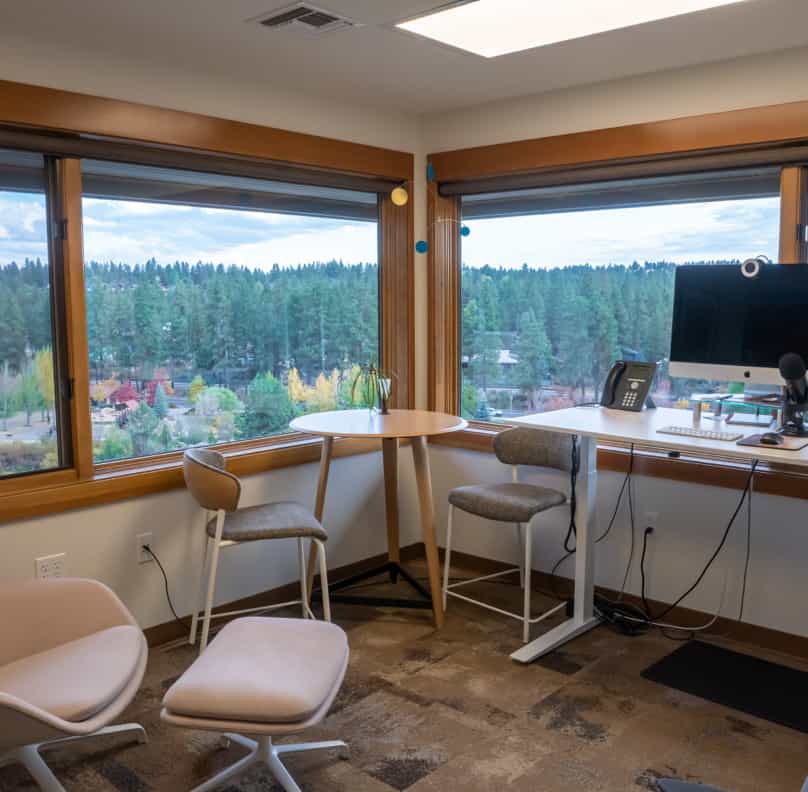If you’re one of the millions who’ve ditched your work commute, you may be asking yourself this: what’s the best work environment for me? For many remote workers, heading to a coffee shop might be the first space to consider, after home offices. However, when weighing a coworking space vs coffee shop, there are plenty of pros and cons to consider.
Remote Work Trends
Two trends have more workers heading to coffee shops and coworking spaces:
- The Great Resignation: Roughly 146,666 U.S. workers quit their jobs per day in April. And, more than 4 million workers have quit each month for nearly a year.
- Remote work: According to a Gallup report, the number of fully-remote office jobs jumped from 8% in pre-pandemic times to 39% in February.
Despite the influx of places that offer free WiFi—like gyms, libraries, and restaurants—coffee shops and coworking spaces are still the most popular for getting work done. Both spots provide access to freshly brewed coffee, social interactions, and a place to separate home life from work life.
However, coffee shops and coworking spaces aren’t equal when it comes to a workspace. Here, we’ll break down the pros and cons of working from home, a café, and a coworking space. We’ll also cover one of the most-asked questions for remote work newbies: what is a coworking space?

Networking Events
For remote workers, community and socialization are two of the arguments for getting out of the house. Whether it’s meeting new people or networking with like- professionals, maintaining human connection is imperative.
Networking at Coffee Shops
When café working, you get to chat with the barista and maybe even strike up a conversation with another patron. Working in a coffee shop can provide a coworking-like space, but it doesn’t have the consistency of people you’ll find in a coworking space.
Networking at Coworking Spaces
Coworking spaces want their members to enjoy where they work. And, one way they do that is by nurturing connections. Often, you’ll see coworking spaces hosting social and networking events. Typically, these events offer the opportunity to meet potential new clients, service providers, and collaborators.
Coworking spaces have become a hub for building relationships for thousands of workers that have relocated during the pandemic. Additionally, coworking spaces provide a sense of community for new residents.

Remote Work Productivity
When you have somewhere to show up, waking up earlier and starting the day can be more motivating. Notably, having a physical space to work that’s away from home can help increase your productivity.
Coffee Shop Productivity
If you choose to work in a coffee shop, you’ll want to consider productivity. That’s because productivity in a coffee shop often relies on strong WiFi connections and access to an electrical outlet.
So, if you can secure both, you’re usually good to go. Also, coffee shop chatter and music can provide the ambient noise many remote workers seek. However, this is a best-case scenario.
On the other hand, you may experience too much noise from customers and a slow internet connection. Access to an outlet is not always guaranteed, and the productivity potential may be significantly less than in an office environment.
Coworking Space Productivity
Coworking spaces are typically designed with productivity in mind. There are usually a variety of private and collaborative workspaces to choose from, and seating is likely easy to access. Not only are the workspaces comfortable, but usually offer an outlet to keep your laptop charged throughout the day.

Here, you’ll find the ambient sound of a coffee shop ideal for working. But, you won’t find the pressure to buy a coffee refill or move seats. Plus, coworking spaces offer amenities like bottomless coffee, high-speed WiFi, meeting rooms, and a place to store your lunch.
So, what’s the catch? The day rate or monthly membership fees are higher than sitting in a café. However, depending on how much you drink and snack, the cost may actually be comparable.
Conference Rooms and Dedicated Work Spaces
Access to a dedicated space or private conference room is often necessary for many remote workers. At the very least, remote workers often require a quiet space to focus and tap into “deep work.”
Coffee Shop Privacy
Most likely, you’ll seldom find quiet areas in coffee shops. After all, their purpose is primarily socializing and relaxation, not working. People working in coffee shops may find better privacy and quiet spaces at their local library. Public libraries offer free WiFi and the promise of low-volume voices.
Coworking Space Privacy
With remote workers in mind, coworking spaces offer a variety of dedicated and quiet shared workspaces. Whether it’s a soundproof phone booth or a reservable meeting room, you’re more likely to find privacy in a coworking space. However, you’re sure to find a “coworking café” style environment in the flex spaces. In fact, kitchen areas of coworking spaces are similar to the office coffee shop you’d find in a traditional office.

Coworking Space vs Coffee Shop
In addition to the pros and cons listed above, here are some questions to ask yourself to determine your ideal work environment:
- How frequently do you have meetings?
- Are your meetings typically in person, online, or a mix of both?
- Do you prefer a quiet workspace or some background noise?
- Are you looking to make new friends and network?
- What’s your budget?
- What are your working hours?
- How often do you travel?
Overall, the benefits of coworking spaces often outweigh those of a coffee shop. While visiting your local coffee shop can be beneficial on an ad hoc basis. But the consistency and security of a coworking space can increase your productivity and work output.
So, if the digital nomad life has you seeking a workspace to call “home,” check out The Haven’s coworking options, including:
If you’re not sure which plan is right for you, try out our trial membership option. It’s just $149 your first month. Then, if coworking is right for you, choose the plan that works best for your lifestyle.


